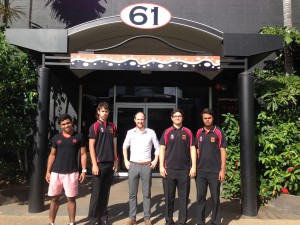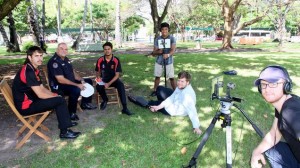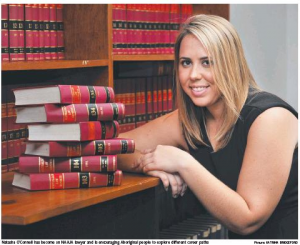News
Berrimah Prison not good enough
Berrimah Prison not good enough for our kids: Community organisations call for better deal for Territory’s most vulnerable
Aboriginal community-controlled organisations, peak organisations, community welfare and public health groups from the Northern Territory and around the country are calling for a new direction in youth justice policy in the Northern Territory.
Media Release – Berrimah Prison is not good enough for Territorys most vulnerable kids joint statement 2 October 2014
Recent Supreme Court case highlights systemic problems in NT’s Alcohol Protection Order regime
Lawyer encourages others to follow their dreams
ABORIGINAL people can achieve in careers outside sport and art, the Territory’s newest lawyer has said. The North Australian Aboriginal Justice Agency’s fifth Aboriginal lawyer, Natasha O’Connell, was admitted to practice on July 29 in Darwin. “It just means you can achieve what you want to achieve if you set your goals and go for it,” the 25-year-old said. “Aboriginal people don’t have to be footballers or singers or dancers. You’re not restricted to sports or arts you can be teachers, or doctors, or lawyers, or journalists.” Natasha was born and raised in Darwin. She studied at Charles Darwin University and at Australian National University. She started working at NAAJA after Year 12 in 2007 and did an NT Government apprenticeship with the Attorney-General’s office before returning to NAAJA. “Most of my work is with the criminal section taking on duty maters in court, people coming into custody, hearings, and bail applications,” she said. She is also an Aboriginal Peak Organisations Northern Territory police officer. “Just making sure laws that are passed have a positive effect,” she said. Natasha is descended from the Lurijta clan group whose traditional lands are at Tijikala and the Wombaia clan group, whose traditional lands are at Anthony’s Lagoon. NAAJA chief executive officer Priscilla Collins said: “Natasha’s pathway to becoming a lawyer is an inspiration to all Aboriginal Territorians’. By Conor Byrne of the NT News
Filming Law Stories
NAAJA (The North Australian Aboriginal Justice Agency) recently partnered with ABC Open Top End to host four young people for a five day filmmaking internship. Three of the youth team are from Casuarina Secondary College’s Clontarf Foundation and one is a student at Darwin High School.
Participants Leroy Tipiloura, Matthew Pollard, Peter Bamblett and Joel Greenhoff met up with NAAJA lawyers Rohan Thwaites, Lydia Alexander and myself at the NAAJA offices, bef ore heading over t o ABC studios to meet Will Tinapple and begin our filmmaking adventure.
o ABC studios to meet Will Tinapple and begin our filmmaking adventure.
ABC News Story – Please click here

NAAJA Urges Government to Reconsider Cutting the Larrakia Nation Prisoner ID Program
23 July 2013
The North Australian Aboriginal Justice Agency (NAAJA) calls on the NT Government to reconsider its decision to discontinue funding the Larrakia Nation’s Prisoner ID program.
The Larrakia Nation Prisoner ID Program came about because many Aboriginal people lack the documentary evidence to obtain other forms of identification. The Program enables many Aboriginal people to obtain photographic ID, without which it is impossible to access basic services like getting a job, opening a bank account, or travelling on an airplane.
NAAJA’s Throughcare project helps Aboriginal people make the transition from jail back into the community. ‘Identification is a huge problem for many of our clients’, said Samantha Taylor-Hunt, Coordinator of NAAJA Throughcare.‘Many of our clients are unable to even get a birth certificate because there is no registry of their birth. They are unable to meet the requirements of any other form of photo ID,’ said Ms Taylor-Hunt.
‘If the Government is serious about increasing employment among Aboriginal people, it needs to see practical barriers like accessing identification which must first be overcome,’ said NAAJA’s CEO Priscilla Collins.
NAAJA calls on the government to reconsider its decision to cut funding to the Larrakia Nation Prisoner ID program.
‘It is essential that photo ID be accessible to Aboriginal people. Without the Larrakia Nation Prisoner ID Program, this will not be the case and it will set up prisoners to fail,’ Ms Collins said.
Contact: Priscilla Collins
08 8982 5100
0427 045 665
Time to Stop and Re-think our Approach to Alcohol Policy in the Territory
A broad range of groups and individuals from across the community have called on the NT Government to shelve its plans for mandatory rehabilitation and work with all relevant stakeholders to get alcohol policy right for the Territory.
“In the last few weeks we have heard a growing chorus of experts and groups working in this area speaking against the Government’s plans to lock up people with a drinking problem,” said Priscilla Collins, CEO of the North Australian Aboriginal Justice Agency.
“This alcohol policy will place an increased pressure on legal and health services that already have stretched resources”.
“Everybody knows that the Territory has Australia’s biggest problem with grog. We all want to see an end to the grog-fuelled violence that is causing havoc in our community. We all want action. But mandatory rehabilitation, charging people if they leave treatment when they have not committed any previous offence, is the wrong way to go. We can’t afford to waste over 100 million dollars on a scheme that is not backed by any scientifically confirmed evidence.”
“The NT Governments should invest in addressing the issues that lead to alcohol abuse, disempowerment and social determinants of health”.
“They should also introduce a minimum floor price, alcohol free day on Centrelink pay day, and expand Alcohol Management Plan’s to include the supply of alcohol”.
The Government has also said it will introduce Alcohol Protection Orders that will allow police to ban people from drinking if they have been charged with an offence involving alcohol. It will then be an offence to breach an order.
“Alcohol Protection Orders will criminalise drinking and see many more people go to jail. We know that people with a serious grog problem will not be able to comply with the orders. This will have a particularly heavy impact on Aboriginal people and is exactly the opposite of what the Royal Commission into Aboriginal Deaths in Custody recommended 20 years ago. We must not take the Territory backwards to failed policies of the past,” said Ms Collins.
“We call on the NT Government to shelve its plans for mandatory rehabilitation and Alcohol Protection Orders and work with stakeholders on a comprehensive policy for tackling the Territory’s grog problem. We need to get this right and base our approaches on real evidence.”
“We have put out this statement on behalf of the groups and individual listed below. We are united in our call for the NT Government to change direction on this important issue,” concluded Ms Collins.
Contact: Priscilla Collins
08 8982 5100
0427 045 665
Concerned Territorians include:
- North Australian Aboriginal Justice Agency
- Aboriginal Peak Organisations (NT)
- Northern Land Council
- Central Australian Aboriginal Legal Aid Service
- Criminal Lawyers Association of the NT
- AMSANT
- Northern Territory Legal Aid Commission
- People’s Alcohol Action Coalition
- Larrakia Nation
- North Australian Family Violence Legal Service
- Katherine Women’s Information and Legal Service
- Northern Territory Council of Social Services
- Darwin Community Legal Service
- Central Australian Aboriginal Congress
- Djabulukgu Association Incorporated
- Julalikari Council Aboriginal
- Theresa Roe
- Central Land Council
- Darwin Aboriginal & Islander Women’s Shelter
NAAJA, CAALAS, NTLAC Submission on the Alcohol Mandatory Treatment Bill
NAAJA, CAALAS and NTLAC make a joint submission to Penny Fielding, the Department of Health in relation to the Alcohol Mandatory Treatment Bill.
The Submission explains our concerns with the Bill, including:
- Mandatory detention for up to 14 days of all adults who are admitted to an assessment facility;
- De facto denial of legal representation before the Tribunal;
- Ineffective appeal provisions;
- Additional pressure on the court system; and
- Unjustifiably high cost of implementing a non-evidence based scheme.
Mandatory Sentencing: When you are in a hole… keep digging
Representatives from NAAJA appeared before the inquiry of the Senate Standing Committee on Legal and Constitutional Affairs on 1 May 2013 into the value of a justice reinvestment approach to criminal justice in Australia. NAAJA used the opportunity to highlight the crisis in the NT criminal justice system.
New Laws Won’t Fix the Territory’s Drinking Problem
NAAJA has criticised the NT Government’s announcement of alcohol protection orders as being ineffective, a waste of money and potentially dangerous.
Churchill Fellowship Report
NAAJA’s Advocacy Manager, Jared Sharp, has authored the Churchill Fellowship Report to investigate strategies for increasing the cultural integrity of court processes for Aboriginal young people and their families in the Northern Territory Youth Justice System.
The project looks at innovative approaches in Canada, the United States and New Zealand to improve the cultural relevance of the justice system for Aboriginal people. Twenty recommendations have been made which aim to make practical and tangible changes to reduce the negative impacts of the justice system on Indigenous people.
130520 New report calls for Two-Way Justice in the NT 20th May 2013

